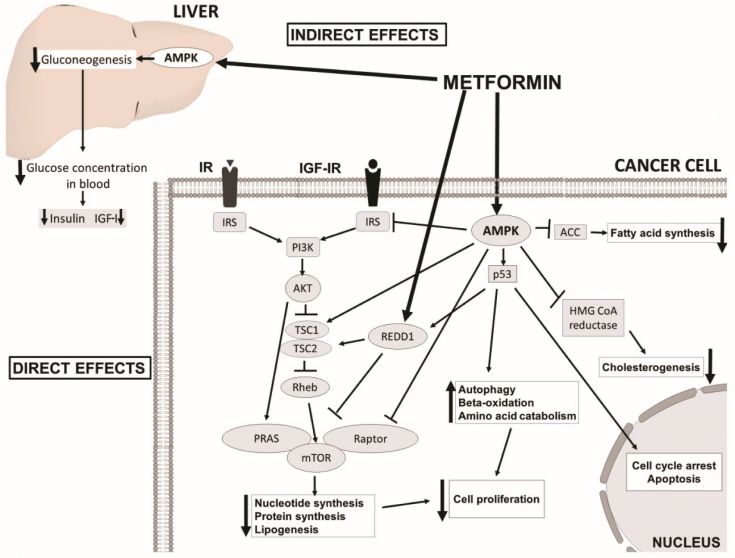Hong Kong researchers found that Metformin is associated with a lower risk of gastric cancer in diabetic patients after H. pylori eradication.
"While previous studies have suggested a potential effect of metformin in reducing gastric cancer in patients with diabetes, these studies did not take into account the state of H. pylori infection, which is one of the most important risk factors for gastric cancer," said Dr. Wai K. Leung.
In the article estet-portal.com you can read the results of the new study.
Anti-oncogenic effect of metformin administration
Insulin-dependent (indirect effects) and AMPK-dependent molecular mechanisms (direct effects) underlying the anti-cancer effects of metformin. Activation of AMPK in the liver results in lower levels of insulin and insulin-like growth factor 1 (IGF-1) and, as a result, a reduced downstream signal.
In AMPK cancer cells inhibits PI3K/AKT/mTORC1 transmission directly through phosphorylation of the Raptor subunit and indirectly through phosphorylation of the TSC1/2 complex and insulin receptor substrate 1 (IRS1), and activation of DNA damage-regulated 1 (REDD1).
In addition, metformin-induced AMPK activation leads to p53 phosphorylation, apoptosis, and autophagy.
Prediabetes: active intervention or passive surveillance
Inhibition of mTORC1 leads to a decrease in global protein synthesis and lipogenesis. Metabolic changes are also achieved through the inhibition of acetyl-CoA carboxylase (ACC) and 3-hydroxy-3-methylglutaryl-CoA (HMG-CoA) reductase.
Metformin reduces hyperinsulinemia and the production of IGF, which can increase the proliferation of cancer cells with IGF receptors.
Follow us on Instagram
Metformin: benefits beyond glucose control
Dr. Leung's team investigated the potential preventive effect of metformin on gastric cancer in more than 7,000 diabetic patients who received H. pylori eradication therapy. 5368 patients in the sample were taking metformin.
During follow-up of 7.1 years, 37 patients (0.51%) were diagnosed with gastric cancer. The risk of developing stomach cancer was 51% lower among patients who took metformin, which significantly reduced the number of cancer cases per 10,000 person-years.

Each one-year increase in metformin use was associated with a 15% reduction in risk of gastric cancer and had a dose-dependent effect of metformin: 27% lower risk of cancer at a cumulative daily dose (cDDD) of less than 975 mg and a 67% risk at cDDD equal to 975 mg or more, compared with patients who did not take metformin.
In comparison, the risk of stomach cancer was 19% lower among patients taking insulin.
HbA1c levels do not appear to affect the risk of stomach cancer.
In patients with diabetes, the use of metformin may reduce the risk of developing gastric cancer after H. pylori eradication.
This is the first study demonstrating the preventive anti-oncogenic effects of metformin on the gastrointestinal tract in diabetic patients who received H. pylori eradication therapy.
Thank you for staying with estet-portal.com. Read other interesting articles in the "Endocrinology" section. You may be interested in How to recognize diabetic neuropathy
Adapted from Medscape







Add a comment